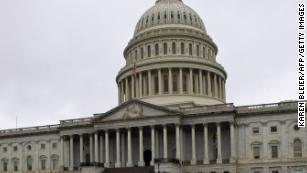
Negotiators say they reached an agreement in principle to avert shutdown
Why Trump's threat to declare a national emergency freaks out Republicans
begin quote from:
41 mins ago - Why Trump's threat to declare a national emergency freaks out Republicans. Analysis by Michael Warren, CNN. Updated 3:46 PM ET, Tue ...
CNN: Why Trump's threat to declare a national emergency freaks out Republicans. 2019-02-12 (Today's News)Total Views: 2 | Last 7 Days: 1. As the Feb.
7 days ago - Those who see Trump as a threat to democracy comfort themselves with the belief ... For instance, the national emergency that Truman declared in 1950, during the ..... To carry out this threat, the president could declare a particular street .... A few of his Republican supporters in Congress begin to distance ...
Why Trump's threat to declare a national emergency freaks out Republicans
Washington (CNN)As the Feb. 15 deadline looms for Congress to reach an agreement on border-security funding, there is renewed optimism for a potential deal.
Among the early details of a tentative agreement reached Monday night, according to a Democratic source, are that it includes $1.375 billion for fencing and about 40,000 beds for housing border detainees. Those are both significant reductions from what Trump had originally asked for. It's unclear whether the President would support such a deal, meaning there's still the potential for a second government shutdown.
A possible agreement also doesn't mean the President won't end up declaring a national emergency to secure the kind of money he really wants to build a wall, particularly if the bill Congress sends him falls this short of the $5.7 billion he'd demanded in the first place. While Trump has at times seemed intrigued by the idea of declaring a national emergency, Republicans in Washington aren't so thrilled by it.
That's because doing so could set off a chain of events on Capitol Hill that risks splitting the Republican conference, undercutting other parts of Trump's agenda and likely opening the administration's actions to legal challenges. It would also provide a clarifying moment that Republicans on the Hill have managed to avoid since Trump took office -- casting an up or down vote on whether to build the full-scale wall Trump desires.
According to federal law, Congress can rescind a presidential emergency declaration by passing a joint resolution. In the likely event that such a bill would be vetoed by the President, Congress could then override it with a two-thirds majority in the Senate and the House.
The danger to congressional Republicans isn't having to overcome a presidential veto, but in having to vote on the resolution itself. Any such measure would be considered privileged -- if, for example, the House passed it then the Senate would be required by law to vote on the measure within 18 days. Senate Majority Leader Mitch McConnell would be powerless to stop a floor vote.
Republicans have been looking for a way to avoid that altogether. For weeks, GOP leaders in the Senate have publicly tried to dissuade Trump from declaring a national emergency. Last month, even before the end of the 35-day government shutdown, one GOP senator approached the White House counsel's office to encourage the President to embrace a narrower executive action to fund a border wall without declaring a national emergency, according to a person familiar with the conversation. That would limit Democrats' ability to block Trump's actions, and also the amount of federal dollars he could use to start building the wall.
That's why, for all the public and private appeals about not pursuing a national emergency declaration, Republicans still worry Trump won't be satisfied by anything less. "You just never know what direction this White House will go," says a Republican Hill source.
Political grenade
In the scenario Hill Republicans fear most, Trump declares a national emergency and House Democrats quickly pass a joint resolution against it, sending what amounts to a political grenade into the Senate. There, Republicans would be forced into either supporting a national emergency or rebuking a GOP president on his signature issue.
It would also force them to grapple with a handful of other thorny issues -- from executive overreach to separation of powers to raiding Pentagon money to pay for border security.
For certain Republicans who criticized Obama for sidestepping Congress and relying on executive action, this presents a bit of a no-win situation. Sens. Ted Cruz and Rand Paul blasted Obama for acting like a "monarch" and a "king" when taking executive action on immigration issues.
Faced with having to vote on a privileged resolution overturning Trump's emergency declaration for the wall, Cruz and Paul could either turn a blind eye to similar circumvention by Trump, inviting accusations of hypocrisy, or defy the President and risk looking weak on border security.
Dangerous precedent
Many Capitol Hill Republicans would balk at assenting to a new norm on national emergencies, and worry about setting a precedent that future Democratic presidents could use to push a left-wing agenda item.
Two GOP sources cited Texas Sen. John Cornyn's public opposition to the move as a clear attempt to send that message to Trump.
"The whole idea that presidents -- whether it's President Trump, President Warren or President Sanders -- can declare an emergency and somehow usurp the separation of powers and get into the business of appropriating money for specific projects without Congress being involved, is a serious constitutional question," Cornyn told CNN on Feb. 4.
Constitutional issues aside, congressional appropriators in both parties guard their power closely, and an emergency declaration that redirected billions of taxpayer dollars would be seen as a clear theat. "Taken to an extreme, it would render the appropriations process meaningless," Republican Sen. Susan Collins of Maine told CNN.
Defense hawks and swing-staters
Defense and national security hawks also have reason not to support Trump's executive order, which could raid the Defense Department and redirect money earmarked for disaster recovery and military construction projects. One Hill GOP source says Trump's purported plans would would affect projects in every state.
And then there's the threat to swing-state GOP senators like Cory Gardner of Colorado and Martha McSally of Arizona, who risk alienating moderate voters if they have to vote to support Trump's national emergency, and inviting contempt from the President or conservative voters if they don't.
Congressional maneuvering
How would this nightmare play out? If Congress cannot make a deal that satisfies the White House by the Friday deadline, the President might issue the emergency declaration immediately. That would prompt a House committee -- probably Judiciary, which oversees immigration issues -- to debate and vote on a resolution rescinding the emergency. After the Democratic majority there would recommend the resolution, the full House would vote and almost certainly pass it.
That would kick off 15-day timeline for the corresponding Senate committee to consider the resolution. The majority-Republican committee would make its recommendation and the resolution would become pending business on the Senate floor, requiring a vote within three days.
Counting the votes
There are 53 Republican senators, so it would take just four GOP defections to pass the resolution out of the Senate. If it passes, Trump would still have to sign the resolution to rescind the emergency. He would almost certainly veto it. Congress could still override that veto, though that would take a two-thirds majority in both chambers. That's a much tougher task, requiring at least 55 Republicans in the House and 14 Republicans in the Senate to break with Trump.
At that point, though, Trump and plenty of members of his own party will have found themselves at odds with each other on the very issue Trump's has staked his presidency on. Avoiding such a scenario, then, would be a top political priority for Republican lawmakers. Otherwise, Hill Republicans will be stuck between a President determined to get his wall and newly empowered House Democrats determined to deny it to him.
Barring a solution to the border-wall standoff on Capitol Hill, the best-case scenario for McConnell and his conference would be for Trump to take a narrow executive action that satisfies the President's expectations. Executive action may draw angry responses from Democrats but it would stave off the nightmare scenario.


















No comments:
Post a Comment